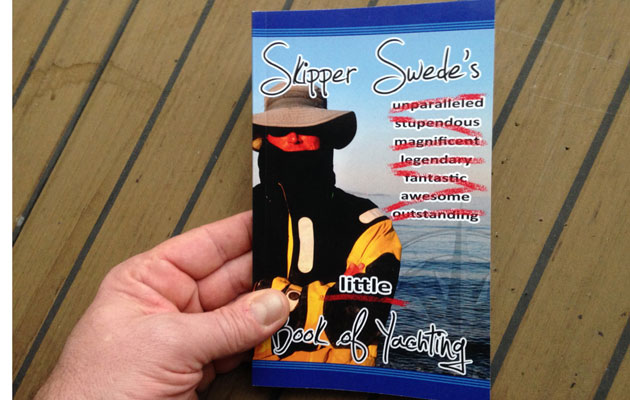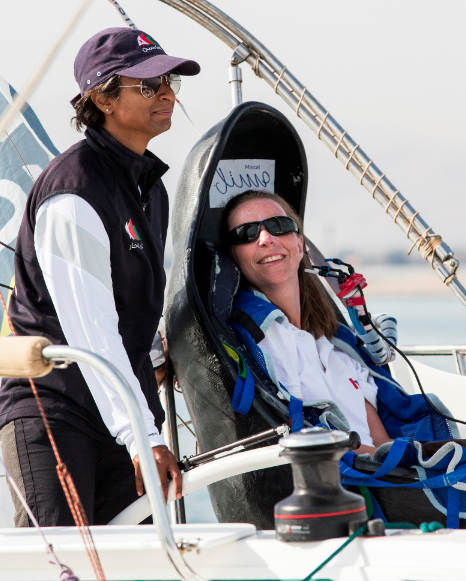When Balfour is kidnapped and sent to the Carolinas in Robert Louis Stevenson's novel 'Kidnapped', he is nearly killed in a shipwreck but the event sets him free

By this time, we had got round Iona and begun to come alongside Mull. The tide at the tail of the land ran very strong, and threw the brig about. Two hands were put to the helm, and Hoseason himself would sometimes lend a help; and it was strange to see three strong men throw their weight upon the tiller, and it struggle against and drive them back.
This would have been the greater danger, had not the sea been for some while free of obstacles. Mr Riach announced from the top that he saw clear water ahead.
‘Ye were right,’ said Hoseason to Alan. ‘Ye have saved the brig, sir; I’ll mind that when we come to clear accounts.’ And I believe he would have done it. But this is only for conjecture, things having gone otherwise than he forecast.
‘Keep her away a point,’ sings out Mr Riach. ‘Reef to windward!’
And just at the same time the tide caught the brig, and threw the wind out of her sails. She came round into the wind like a top, and the next moment struck the reef with such a dunch as threw us all flat upon the deck, and came near to shake Mr Riach from his place upon the mast.
I was on my feet in a minute. The reef on which we had struck was close in under the southwest end of Mull, off a little isle they called Earraid, which lay low and black upon the larboard. Sometimes the swell broke clean over us; sometimes it only ground the poor brig upon the reef, so that we could hear her beat herself to pieces; and what with the great noise of the sails, and the singing of the wind, and the flying of the spray in the moonlight, and the sense of danger, I think my head must have been partly turned, for I could scarcely understand the things I saw.

Kidnapped was first published by Cassell and Co in 1886
We had one of the wounded men keep a watch upon the seas and cry us warning. Well, we had the boat about ready to be launched, when this man sang out: ‘For God’s sake, hold on!’ We knew by his tone that it was something more than ordinary; and sure enough, there followed a sea so huge that it lifted the brig right up and canted her over on her beam. Whether the cry came too late or my hold was too weak, I know not; but at the sudden tilting of the ship I was cast clean over the bulwarks into the sea. I went down, and drank my fill; and then came up, and got a blink of the moon; and then down again. They say a man sinks the third time for good. I cannot be made like other folk, then; for I would not like to write how often I went down or how often I came up again. All the while, I was being hurled along, and beaten upon and choked, and then swallowed whole; and the thing was so distracting to my wits, that I was neither sorry nor afraid.
Presently, I found I was holding to a spar, which helped me somewhat. And then all of a sudden I was in quiet water, and began to come to myself.
I was amazed to see how far I had travelled from the brig. She was still holding together; but whether or not they had yet launched the boat, I was too far off and too low down to see.
While I was hailing the brig, I spied a tract of water lying between us, where no great waves came, but which yet boiled white all over and bristled in the moon with rings and bubbles. Sometimes the whole tract swung to one side, like the tail of a live serpent; sometimes, for a glimpse, it all would disappear and then boil up again. I now know it must have been the roost or tide race, which had carried me away so fast and tumbled me about so cruelly, and at last, as if tired of that play, had flung out me and the spare yard upon its landward margin.
I now lay becalmed, and began to feel that a man can die of cold as well as of drowning. The shores of Erraid were close in; I saw in the moonlight the dots of heather and the sparkling of the mica in the rocks.

Robert Louis Stevenson
Stevenson, (1850-94) was born in Edinburgh, the son of an engineer. He was often sickly and rather than follow in his father’s footsteps, he trained as a lawyer before pursuing a career in writing. He wrote widely for periodicals whilst travelling in search of better health. While on a canoe trip in France he met, and later married, Fanny Osborne, an American divorcee 10 years his senior.He wrote prolifically but found fame with Treasure Island, followed by The Strange Case of Dr Jekyll and Mr Hyde and the Scottish romances, of which Kidnapped is the first. In 1888 he sailed with his family to Samoa, where he died of a brain haemorrhage.

About the book
Kidnapped, first published by Cassell and Co in 1886, is still in print and is widely available from multiple publishers and as an eBook
Dick Durham’s book of sea stories republished
Dick Durham’s wonderful collection of sailing stories from across centuries and around the world is being published in paperback in…
Review – Skipper Swede’s little book of yachting
Chris Beeson reviews a book that blurts out what every sailor thinks when their patience is tested
Hilary Lister hits the record books again
Brave disabled sailor crosses ocean
New book and exhibition of stunning RNLI images
Atmospheric shots of crews and fundraisers around the coast








